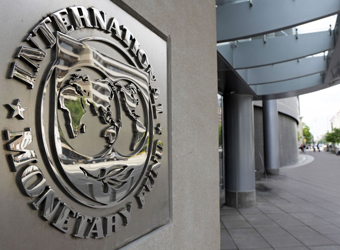Despite slashing the economic growth outlook for the U.S. and U.K., the International Monetary Fund has kept its global growth forecast unchanged on expectations the euro zone and Japanese growth would accelerate.
In the July update of its World Economic Outlook, the IMF forecast global economic growth of 3.5 percent for 2017 and 3.6 percent for 2018, unchanged from its April outlook.
That was despite earlier cutting its U.S. growth projection to 2.1 percent from 2.3 percent for 2017 and to 2.1 percent from 2.5 percent for 2018, citing both weak growth in the first quarter of this year as well as the assumption that fiscal policy will be less expansionary than previously expected.
A weaker-than-expected first quarter also spurred the IMF to cut its forecast for U.K. growth for this year to 1.7 percent from 2.0 percent, while leaving its 2018 forecast at 1.5 percent.
But slowdowns in the U.S. and U.K. were expected to be offset by increased forecasts for many euro area countries, including Germany, France, Italy and Spain, where first quarter growth largely beat expectations, the IMF said.
“This, together with positive growth revisions for the last quarter of 2016 and high-frequency indicators for the second quarter of 2017, indicate stronger momentum in domestic demand than previously anticipated,” the IMF said in its release.
It raised its euro-area growth forecast for 2017 to 1.9 percent from 1.7 percent. For 2018, it increased its forecast to 1.7 percent from 1.6 percent.
The IMF tweaked its Japan forecast for 2017 to growth of 1.3 percent, up from 1.2 percent forecast in April, while leaving its 2018 forecast unchanged at 0.6 percent.
Additionally, the IMF raised its China growth forecast for 2017 by 0.1 percentage point to 6.7 percent, citing a stronger-than-expected first quarter. For 2018, the IMF raised its China growth forecast by 0.2 percentage point to 6.4 percent on expectations authorities will maintain high public investment to meet their target of doubling 2010 real gross domestic product (GDP) by 2020.
For the short term, the IMF saw global risks as “broadly balanced,” but added that, in the medium term, risks were “skewed to the downside.”
“Protracted policy uncertainty or other shocks could trigger a correction in rich market valuations, especially for equities, and an increase in volatility from current very low levels,” the IMF said. “In turn, this could dent spending and confidence more generally, especially in countries with high financial vulnerabilities.”
For the U.S., contradicting policies: Implementing fiscal stimulus proposals, such as revenue-reducing tax reforms, could push up demand and output growth, but pursuing the spending-cut proposals in the administration budget would drive those down.
Maurice Obstfeld, economic counselor and director of research at the IMF, told CNBC’s “Capital Connection” on Monday that it wasn’t clear when any U.S. reforms would come through.
“We had initially thought back in January that they would come online pretty quickly. Now, that has not happened, so we’ve changed our growth forecasts,” he said. “There is the potential to increase growth through, for example, tax reform, but when we see it we’ll have a better idea of when the effects might be felt.”
But Obstfeld added that President Donald Trump’s goal of the U.S. reaching sustained GDP growth of 3 percent would be “challenging.”
“The U.S. has not grown on that rate for a while — at least not on a sustained basis,” he said. “While we could see a quarter or two of 3 percent growth, getting there on a sustained basis would be hard given some of the headwinds we’ve seen in terms of productivity growth and demographics.”
The IMF added that, in Europe, positive market sentiment and fewer political risks mean activity could be stronger than projected.
The organization also expressed concern about commodity-exporting nations, as lower prices would exacerbate economic strains. It noted that commodity exporters’ economic growth has been below pre-crisis averages and it advised those nations to continue adjusting to lower revenues and diversifying their sources of growth.
“Commodity exporters, as a rule, need to diversify,” Obstfeld told CNBC. “The China card, which was so successful in the 2000s and the early part of this decade, is increasingly absent as China rebalances away from very commodity-intensive activities. So clearly the old models are not going to work and governments in those exporters need to be thinking hard about how to broaden their economies.”
Looking ahead, the IMF advised policymakers to address medium-term concerns by promoting global cooperation and free and fair trade.
“A rule-based and open world trading system is especially vital for global prosperity, but it must be supported by domestic policies to facilitate adjustment, not only to trade but to rapid technological change,” the IMF said.
“Active dialogue and cooperation will help to improve and modernize the rules, while addressing valid country concerns. This process will ensure continued mutual benefits and even-handedness,” it added.
Source: CNBC


